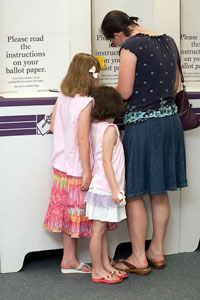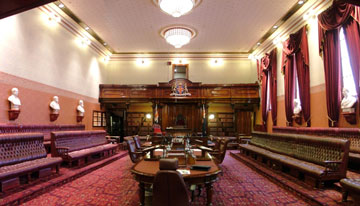

 "The Chamber of the NSW Legislative Council"
"The Chamber of the NSW Legislative Council"
The NSW Legislative Assembly is the Lower House. The political party (or coalition of parties) with the majority of locally elected representatives in the Lower House forms the executive government, with the party's leader becoming the state's Premier. It is from the Lower House that most, but not all, legislation arises.
The NSW Legislative Council is the Upper House, and its make-up and purpose is well worth considering in some detail. The following points about the Legislative Council all come verbatim from the NSW Parliament's own web-site. This web site is maintained by the NSW Public Service, not political parties, and is largely independent of the government of the day.
Rather, think about who else you would like to review, appropriately amend, or indeed even reject legislation coming from the Lower House.
Don Chipp, the high profile leader of the Australian Democrats from 1977 - 1986, very rightly observed the need for Upper House vigilance in his famous phrase "keep the bastards honest".
With your Upper House vote you have an opportunity to "keep the bastards honest".
We recommend you exercise this opportunity wisely, and Vote for the Environment.
Consider the following, before you vote.
- "The Legislative Council has three main functions: to represent the people, to legislate and to scrutinise the executive government as a 'House of review'."
- "The Legislative Council provides an alternative and complementary system of representation to that of the Legislative Assembly. Members of the Council are elected for eight years under a system of proportional representation from a single electorate encompassing the whole State of New South Wales. By contrast, members of the Assembly are elected for four years using optional preferential voting from 93 separate electorates within the State.
As a result of these different electoral arrangements, the Council's membership usually includes representatives from a range of political parties, in proportion to the votes cast, while the Assembly's membership is more likely to be drawn from the two main sides of politics.
The Council's membership therefore tends to be more diverse, reflecting a wide range of opinions and views. This diversity enhances the democratic quality of the Parliament making it more representative of the people it serves." - "The two Houses of the New South Wales Parliament have equal power in the making of laws, except in respect of certain money bills. The Council has power to amend, reject, or fail to pass any bill submitted to it by the Assembly. Consequently, the government of the day requires the agreement of both Houses, and not just the Lower House, to implement its legislative agenda. The need for legislation to be passed by both Houses provides protection against a government with a disciplined majority in the Lower House introducing extreme measures for which it does not have broad community support. It also provides an opportunity for further consultation on proposed legislation and for amendments to be made to legislation where required."
